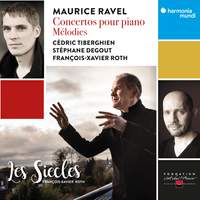Recording of the Week,
Ravel Piano Concertos from François-Xavier Roth and Les Siècles
Today’s Recording of the Week sees François-Xavier Roth and his acclaimed period-instrument ensemble Les Siècles return to Ravel – after triumphant accounts of La Valse, Mother Goose and Daphnis et Chloé, they now present a double-bill of his two piano concertos (with Cédric Tiberghien at the keys of an 1892 Pleyel), supplemented by a selection of solo vocal items sung by baritone Stéphane Degout.

The G major concerto kicks the album off in sunny mood; its lively opening betrays its original conception as a fantasia on Basque traditional folk-songs, with the piccolo’s theme evoking the iconic Basque flute, the txistu. The slow movement seems more akin to Satie than to Ravel, in particular his three elegant Gymnopédies from about four decades earlier; after the extended solo piano opening the wind soloists take over the limelight, allowing space for the subtleties of their period instruments’ sonorities to truly shine. Cor anglais player Stéphane Morvan’s extended, rhapsodic solo, underpinned by Tiberghien’s delicate passagework, is a particular joy.
The concerto concludes with a movement of cosmopolitan – perhaps Petrushkan – hustle and bustle, replete with trumpet fanfares, vulgar trombone glissandi and more than a hint at times of Gershwin’s Piano Concerto and Rhapsody in Blue (both of which – maybe surprisingly – precede it by a few years).
The contrast with the D major concerto for left hand could hardly be greater – perhaps this is why Roth places the majority of the vocal material between the concertos. Stéphane Degout shows himself to be quite the vocal chameleon in the selection of solo songs included; his Don Quichotte tends towards the noble, mercifully far from a pickled and washed-up Falstaff. In the first of the two appropriated Hebrew melodies, he captures the solemn atmosphere of the Kaddish without becoming inappropriately maudlin, rising to an uplifting climax that displays his higher register at its most heroic; the eponymous énigme éternelle of the second heralds a change of gear into a more anxious persona, uneasy with the text’s existential ambiguity. The three settings of Mallarmé’s sumptuously mysterious poetry give up their secrets far less easily, but Degout always remains fluid and responsive to the music, even when it strays into distinctly atonal territory.

The left-hand concerto is unmistakeably a more serious work than either the G major concerto or any of the solo songs. The gravelly, sinister timbre of Jérémie Da Conceição’s opening contrabassoon solo sets the tone for a troubled buildup into the piano’s first entry; this entry, dominated as it is by stark open fifths, does little to dispel the gloom, and even the long-awaited orchestral tutti that succeeds it somehow retains a portentous quality that the concerto struggles to truly escape.
Despite Alfred Cortot notoriously having taken it upon himself to rearrange the work for two hands (against Ravel’s bitter objections), the original piano part often sounds and even looks as if it were already written for all ten fingers. Cédric Tiberghien’s performance is as assured with one hand as it is with two; the enormous leaps from end to end of the keyboard, physically exhausting when executed with the left arm alone as well as posing a greater challenge in terms of accuracy, betray no hint of the effort required. His command of the singing solo sections, with melody and accompaniment both assigned to the single hand, is testament to his flawless technique as much as to Ravel’s ingenious writing.

An excerpt from the piano part – Ravel's exquisitely clever one-hand writing sometimes seems as if it was written for both hands.
Ravel’s sensitive orchestration continues to offer the wind section opportunities to shine; the march-like sections, by turns brash and grotesque, benefit particularly from the slightly less refined tones of the trumpets and trombones. A melancholy melody that evokes the oft-quoted Dies irae plainchant recurs at several points, inviting comparisons with Liszt’s Totentanz; indeed this is a concerto that right up until its closing pages seems dogged by a kind of suppressed angst.
Roth and Les Siècles are fast becoming a byword for top-notch period performances of Romantic French repertoire; having made this niche their own, it was only to be expected that they would come up trumps again, and so it has proved. He may often be reduced to a mere purveyor of refined delicacy, but Les Siècles reveal Ravel in all his variety as few others can – neurotic, jovial, sinister, bustling, wistful and more.
Les Siècles, François-Xavier Roth, Cédric Tiberghien (piano), Stéphane Degout (baritone)
Available Formats: CD, MP3, FLAC, Hi-Res FLAC



